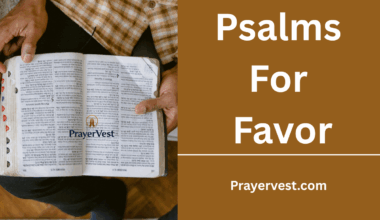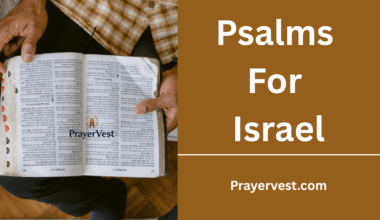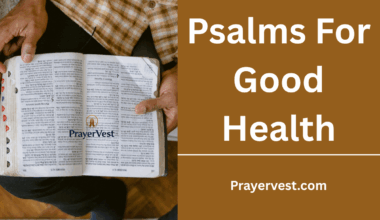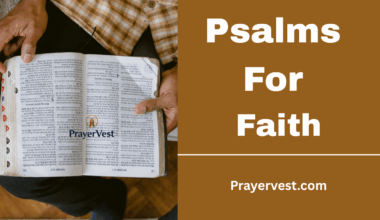The human heart yearns for direction in a world full of choices, ambiguity, and forks in the road. The need for heavenly guidance is constant, whether we’re going through a significant life shift, struggling with a tough decision, or just figuring out the intricacies of day-to-day living.
For individuals looking for God’s guidance, the Book of Psalms, which is full of spiritual insight and sincere prayers, acts as a powerful compass. The Psalms for guidance provide timeless insight into what it means to follow the Lord, having been written by people who themselves sought clarity amid struggles and victories.
A recurring theme in the Psalms is a strong, enduring faith in God’s capacity to guide His people. These verses describe a life stance of humility, submission, and faith in addition to expressing a yearning for direction. The psalmists often confess their frailties and look up to the One whose wisdom is boundless and whose ways are always correct.
The Psalms demonstrate that receiving direction from God is not only feasible but also guaranteed to those who seek Him fervently, from exhortations for deliverance to thanksgiving for prayers that are granted.
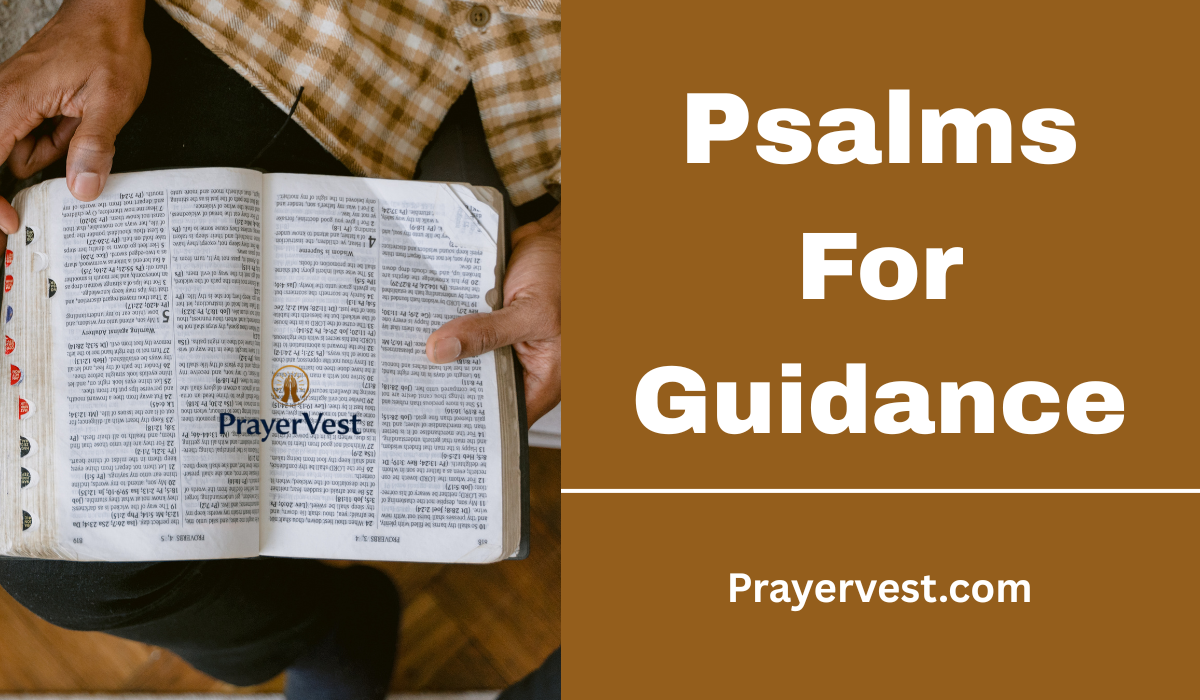

Let these Psalms become more than just old poetry as you consider them for direction. Allow them to influence your prayers, reaffirm your faith, and focus your thoughts on God’s wisdom. These verses will serve as a reminder that the Lord enjoys leading His children, regardless of whether you’re in a time of waiting, wondering, or wandering. The truth that his word is a candle to our feet and a light to our path is eloquently illuminated by the Psalms.
50 Most Powerful Psalms For Guidance (2026)
1. Psalm 9:1
“I will give thanks to you, Lord, with all my heart; I will tell of all your wonderful deeds.”
David declares wholehearted gratitude, recognizing God’s mighty works. This Psalm opens with intentional thanksgiving—not just a fleeting sentiment, but a conscious act of recounting God’s faithfulness. The language of “all my heart” implies a total surrender and a gratitude that flows from deep within, acknowledging not only what God has done, but who He is.
Reflection
Gratitude begins with awareness. When we pause to recount God’s blessings—His past faithfulness, answered prayers, divine interventions—we start to see how deeply He has woven His goodness into our lives. Thanksgiving is more than a response; it’s a spiritual discipline. When we give thanks with our whole heart, we magnify God above our circumstances and recalibrate our focus from what’s lacking to what’s already given. Let gratitude become the lens through which you view each day.
2. Psalm 30:11-12
“You turned my wailing into dancing; you removed my sackcloth and clothed me with joy, that my heart may sing your praises and not be silent.”
These verses express David’s gratitude after deliverance from sorrow. His mourning was transformed into joy—not just emotionally, but physically, as seen in the metaphor of sackcloth being replaced with garments of praise. God’s intervention becomes the reason for ongoing gratitude and public testimony.
Reflection
Some of our deepest gratitude flows from the darkest seasons. When God brings us through trials, grief, or illness, our thankfulness takes on a new depth. It’s not just about saying “thank you”—it becomes an embodied expression of transformation. What was once pain now becomes a platform to proclaim God’s goodness. Don’t hide your testimony. Let the joy of your deliverance become the praise that silences despair in others.
3. Psalm 100:4
“Enter his gates with thanksgiving and his courts with praise; give thanks to him and praise his name.”
This well-known Psalm is a call to corporate worship, instructing God’s people to come into His presence not with requests, but with gratitude. The “gates” and “courts” reference the temple, symbolizing access to God that begins with a thankful posture.
Reflection
Gratitude is the password into God’s presence. Before we present our needs, before we lament our struggles, we are invited to thank Him. Thanksgiving prepares the heart for intimacy with God. It shifts our mindset from consumption to communion, from entitlement to wonder. As you approach God, lead with praise—it’s the key that unlocks deeper fellowship.
4. Psalm 107:1
“Give thanks to the Lord, for he is good; his love endures forever.”
This verse, repeated throughout Scripture, anchors gratitude in the unchanging nature of God. His goodness and enduring love form the bedrock of why we give thanks, regardless of circumstances.
Reflection
When life feels unpredictable, God’s goodness and love remain constant. Gratitude rooted in His character—not just in temporary blessings—creates spiritual stability. It helps us thank Him not only when we feel blessed, but also when we’re waiting, hurting, or unsure. Gratitude is a declaration of trust in His eternal love. Make it your foundation, not your fallback.
5. Psalm 103:2
“Praise the Lord, my soul, and forget not all his benefits.”
David speaks to his soul, reminding himself to remember God’s goodness. It’s an intentional act—gratitude doesn’t always come naturally, especially in hardship. This verse encourages us to recall the benefits of walking with God: forgiveness, healing, redemption, love, and mercy.
Reflection
We live in a world that’s quick to forget and slow to appreciate. But gratitude demands memory. When we intentionally reflect on God’s benefits—both big and small—we shift from spiritual apathy to praise. Begin each day recounting the blessings of yesterday. This practice strengthens faith and renews joy. Don’t let forgetfulness rob you of worship; cultivate a heart that remembers.
6. Psalm 136:1
“Give thanks to the Lord, for he is good. His love endures forever.”
This verse is the opening refrain of a Psalm that repeats God’s enduring love in every line. It affirms that gratitude is due to God simply because of who He is—good, faithful, and loving without end.
Reflection
Gratitude doesn’t always require a specific miracle or answered prayer—it can and should arise from God’s eternal attributes. His goodness is not seasonal. His love doesn’t fade with time. When we rest in this unchanging reality, our thankfulness becomes a daily rhythm, not an occasional reaction. Even on hard days, we can echo this verse: “His love endures forever.”
7. Psalm 28:7
“The Lord is my strength and my shield; my heart trusts in him, and he helps me. My heart leaps for joy, and with my song I praise him.”
David celebrates the Lord as his protector and helper. His gratitude is expressed through joy and song—a natural outflow of trust and answered prayers.
Reflection
When we experience God’s strength in weakness and His protection in danger, it should birth songs of thanksgiving. The heart that trusts becomes the heart that sings. Let your gratitude be audible. Worship through your victories, and even in your waiting. Praise is not just a duty—it’s a delight born from the assurance that God is always working on our behalf.
8. Psalm 34:1
“I will extol the Lord at all times; his praise will always be on my lips.”
Spoken in the context of deliverance, this verse reflects David’s vow to live a life of continual praise. His gratitude isn’t circumstantial—it’s constant.
Reflection
Gratitude that endures is not rooted in comfort but in conviction. When praise becomes a lifestyle, it reshapes how we interpret hardship and success alike. “At all times” means through disappointment, delay, and difficulty. Practice persistent praise. Let thankfulness become the language of your lips and the posture of your life.
9. Psalm 92:1
“It is good to give thanks to the Lord, to sing praises to your name, O Most High.”
This Psalm opens with a declaration that giving thanks is not just proper—it is good. Praising God is not only a command but a source of joy and moral beauty.
Reflection
Some spiritual practices feel hard; others feel life-giving. Gratitude is both a duty and a delight. It’s good for your soul, your relationships, and your perspective. When you give thanks, you not only honor God, you also realign your heart with truth. It’s a healing act. So don’t withhold what is good—sing, speak, and share your thanks freely.
10. Psalm 116:12
“What shall I return to the Lord for all his goodness to me?”
This rhetorical question reflects the psalmist’s awe at God’s generosity. It doesn’t imply repayment—it expresses humble wonder and the desire to live in grateful response.
Reflection
Gratitude often leads us to action. When we consider how much God has done, we are moved to ask: “How can I honor Him with my life?” This isn’t about earning His goodness, but about living in response to it. Gratitude inspires surrender, worship, and faithful obedience. Let your life be the answer to this question—an offering of love poured out in response to God’s overwhelming grace.
11. Psalm 9:1
“I will give thanks to you, Lord, with all my heart; I will tell of all your wonderful deeds.”
This verse reveals a personal and wholehearted expression of gratitude. David doesn’t just feel thankful—he actively proclaims God’s works. It shows how genuine thanksgiving naturally overflows into testimony.
Reflection
True gratitude isn’t silent. When you’re genuinely thankful, you speak of it—you tell others what God has done. Let your heart be so full of appreciation that it spills over into conversation. Sharing your testimony not only honors God but encourages those around you. Don’t hold back your praise; speak it with boldness and sincerity.
12. Psalm 107:8
“Let them give thanks to the Lord for his unfailing love and his wonderful deeds for mankind.”
Psalm 107 repeats this refrain multiple times, calling people to remember God’s mercy and miraculous acts. It reminds us that gratitude should be a collective and continual response to God’s consistent faithfulness.
Reflection
God’s love is not sporadic—it’s unfailing. His deeds are not limited—they are many and marvelous. This verse calls us to pause, reflect, and respond. It encourages a habit of remembrance that leads to thanksgiving. In every chapter of your story, you will find God’s fingerprints. A grateful heart seeks them out, celebrates them, and tells others what it finds.
13. Psalm 30:12
“That my heart may sing your praises and not be silent. Lord my God, I will praise you forever.”
Spoken in response to healing and deliverance, David commits himself to a life of praise. His thanksgiving isn’t momentary—it’s an eternal declaration.
Reflection
Silence may be appropriate in reverence, but not in response to redemption. When God lifts us out of hardship, our hearts should break into song. Praise is not just an emotional response—it’s a spiritual discipline. It’s how we keep our gratitude alive. Don’t let gratitude be fleeting. Make it enduring, vocal, and daily.
14. Psalm 35:18
“I will give you thanks in the great assembly; among the throngs I will praise you.”
This verse shows David’s commitment to public gratitude. He’s not content with private worship—he wants to magnify God’s name in the presence of others.
Reflection
Thankfulness should not be confined to quiet moments alone. Public praise encourages community, strengthens faith, and glorifies God before others. Whether in church, among friends, or in conversation, make it known what God has done. Your testimony might just be the encouragement someone else needs to keep going.
15. Psalm 69:30
“I will praise God’s name in song and glorify him with thanksgiving.”
Amid suffering and affliction, David chooses to praise and give thanks. This verse teaches that gratitude is not reserved for moments of ease—it’s a powerful act of faith in times of pain.
Reflection
Giving thanks in sorrow is one of the deepest forms of worship. It says, “God, I trust You—even here.” Gratitude becomes a weapon against despair, a declaration that God is still good, still sovereign, still worthy. When life hurts, sing anyway. Thank Him anyway. That kind of praise shakes the heavens.
16. Psalm 50:14
“Sacrifice thank offerings to God, fulfill your vows to the Most High.”
This verse connects gratitude with obedience. Thank offerings were expressions of appreciation and devotion—tangible ways of honoring God.
Reflection
Gratitude is more than a feeling—it’s a choice, a sacrifice, and a follow-through. When you’re thankful, show it. Let your actions reflect your appreciation. Fulfill the promises you made to God in prayer. Gratitude that moves from heart to hand transforms worship into living faith.
17. Psalm 95:2
“Let us come before him with thanksgiving and extol him with music and song.”
This verse is an invitation to worship. It encourages joyful gratitude, expressed through song, as the proper way to enter God’s presence.
Reflection
There’s something sacred about approaching God with a thankful heart. Thanksgiving opens the door to deeper worship and intimacy. Don’t come to God only with requests—come with remembrance. Celebrate what He’s already done. Let music and song be the vehicle for your gratitude, lifting your soul into joyful connection with Him.
18. Psalm 107:22
“Let them sacrifice thank offerings and tell of his works with songs of joy.”
This verse reinforces the connection between gratitude, worship, and testimony. It calls for expressive, celebratory thanksgiving through offerings and joyful songs.
Reflection
Your gratitude isn’t complete until it’s shared. Tell others what God has done—not out of duty, but out of joy. Worship becomes deeper when stories of His faithfulness fuel it. Let your gratitude be visible, vocal, and vibrant. Don’t just say thank you—sing it, show it, and live it.
19. Psalm 138:1
“I will praise you, Lord, with all my heart; before the ‘gods’ I will sing your praise.”
David declares his wholehearted worship in the face of competing influences. His gratitude is fearless and focused, refusing to be silenced or diluted by cultural distractions.
Reflection
In a world filled with competing voices and values, wholehearted gratitude to God is a bold stance. It’s a way of saying, “I know who deserves my praise.” Don’t let fear, shame, or peer pressure mute your thankfulness. Stand firm in your gratitude and sing His praises wherever you are—without compromise.
20. Psalm 7:17
“I will give thanks to the Lord because of his righteousness; I will sing the praises of the name of the Lord Most High.”
Here, David’s gratitude stems from God’s justice and righteousness. His praise is rooted in who God is, not just in what He does.
Reflection
Praise anchored in God’s character is never shaken. Even when life is confusing, God’s righteousness stands. Give thanks not only when you receive blessings, but because God is always right, always just, always holy. Let that truth be the foundation of your gratitude, and your heart will always have a reason to sing.
21. Psalm 7:17
“I will give thanks to the Lord because of his righteousness; I will sing the praises of the name of the Lord Most High.”
This Psalm concludes with David expressing his gratitude not for comfort or ease, but for God’s righteousness. Even in the face of injustice and danger, David chooses praise because he trusts in God’s just character.
Reflection
When life feels unfair, gratitude may seem out of reach. But David shows us a higher path—praising God for His righteousness even when the world is unrighteous. God’s justice may not always appear on our timeline, but it is never absent. Choosing to be thankful for God’s unchanging righteousness reminds us that we serve a holy and fair Judge. Gratitude, in this sense, becomes a declaration of faith, a way of anchoring ourselves in divine truth while the storms of life rage.
22. Psalm 9:1
“I will give thanks to you, Lord, with all my heart; I will tell of all your wonderful deeds.”
This verse blends personal gratitude with public testimony. David isn’t content to feel thankful silently—he proclaims God’s deeds openly and wholeheartedly.
Reflection
Gratitude flourishes when shared. It’s one thing to whisper thanks in private; it’s another to shout it with your life. When you testify to God’s goodness, you build faith in others and in yourself. Let your thankfulness become a story others can see and hear. There is power in public praise—it honors God and encourages the weary. A grateful heart is not shy; it speaks boldly of God’s goodness.
23. Psalm 13:5
“But I trust in your unfailing love; my heart rejoices in your salvation.”
This Psalm begins in despair but ends in trust and gratitude. David chooses to rejoice in God’s salvation, even before his situation changes.
Reflection
Gratitude is not always the result of blessings received—it can also be a weapon of spiritual warfare. When we feel forgotten or overwhelmed, praising God for His unfailing love anchors us in His truth. Salvation is not just a past event; it’s a present reality and a future hope. Even when your emotions betray you, your faith can lead you back to joy. Learn to thank God not just for what He’s done, but for who He is and what He has promised.
24. Psalm 26:7
“Proclaiming aloud your praise and telling of all your wonderful deeds.”
David describes worship as both vocal and communal—gratitude expressed aloud in the presence of others. It’s a form of testimony and celebration.
Reflection
We were never meant to keep our gratitude quiet. Public praise fuels communal joy. In church gatherings, family prayers, and conversations with friends, sharing what God has done brings His glory into clearer view. Every time we express thanks, we shine light into darkness. Don’t underestimate the impact of your testimony—it might be the encouragement someone else is desperate for. Gratitude multiplies when we share it.
25. Psalm 30:11-12
“You turned my wailing into dancing; you removed my sackcloth and clothed me with joy, that my heart may sing your praises and not be silent. Lord my God, I will praise you forever.”
This joyful declaration reflects David’s transformation from mourning to joy—a divine exchange that leads to eternal praise.
Reflection
God specializes in turning pain into praise. When you’ve walked through grief and God brings healing, your gratitude becomes deeply rooted. It’s no longer shallow or circumstantial—it’s soaked in tears and carried by grace. Joy that follows sorrow is powerful, contagious, and anchored. This kind of gratitude has a permanence to it—it refuses silence and pledges eternal praise. Let your dance of joy echo through the halls of your testimony, a witness to a God who turns mourning into music.
26. Psalm 33:2
“Praise the Lord with the harp; make music to him on the ten-stringed lyre.”
This verse shows that worship is both expressive and creative. Gratitude can take form in music, instruments, and joyful expression.
Reflection
Gratitude doesn’t have to be confined to words—it can be expressed through creativity, music, and the arts. When we use our gifts to glorify God, we join the ancient chorus of praise that spans generations. Whether you sing, paint, write, or build, let your craft become worship. Gratitude that is expressed creatively not only honors God but inspires others to see His beauty. Your life can become a symphony of thanks when you intentionally create from a heart of worship.
27. Psalm 50:23
“Those who sacrifice thank offerings honor me, and to the blameless I will show my salvation.”
God regards thanksgiving as a form of sacrifice and worship. Gratitude offered even when it’s difficult honors Him deeply.
Reflection
True gratitude isn’t always easy. Sometimes it feels like a sacrifice—especially in seasons of loss, pain, or uncertainty. But that’s when it becomes even more meaningful. Thanking God when it costs you comfort is a powerful act of worship. It’s not about denying your pain—it’s about choosing to see His goodness despite it. The sacrifice of praise invites God’s presence into your hardship and opens the door to deeper fellowship.
28. Psalm 66:16
“Come and hear, all you who fear God; let me tell you what he has done for me.”
This verse is a call to testimony—an invitation to listen and rejoice in God’s goodness.
Reflection
Your story matters. Sharing with others what God has done for you is one of the most powerful expressions of gratitude. It’s not bragging—it’s worship. When you share your journey, you become a witness to God’s grace, and others are encouraged to trust Him too. Don’t keep silent about your answered prayers, your miracles, or your healing. Let your life be a living sermon, proclaiming the faithfulness of God to anyone who will listen.
29. Psalm 67:3
“May the peoples praise you, God; may all the peoples praise you.”
This verse expresses a desire for global worship—a vision of all nations giving thanks to God.
Reflection
Gratitude knows no borders. When we give thanks, we’re participating in a global, eternal song of praise. Every tribe, nation, and tongue is invited to glorify God. Our thanksgiving connects us to a much larger purpose—God’s glory among the nations. Let your gratitude fuel your prayers for the world. Long for a day when every heart bows in worship, and every voice sings of God’s goodness.
30. Psalm 75:1
“We praise you, God, we praise you, for your Name is near; people tell of your wonderful deeds.”
This Psalm begins with collective gratitude, acknowledging God’s nearness and His works among the people.
Reflection
God’s name is not distant—it is near. He is not a remote deity but a present help. Gratitude flourishes when we recognize the closeness of God. It’s not just about what He does—it’s about who He is and how near He chooses to dwell. When people testify of His deeds, they remind others of His presence. Live in awareness of His nearness and let your praise reflect that intimacy.
31. Psalm 79:13
“Then we your people, the sheep of your pasture, will praise you forever; from generation to generation we will proclaim your praise.”
This verse ties gratitude to legacy—praise that transcends generations.
Reflection
Gratitude isn’t just for now—it’s for tomorrow. When we teach our children and communities to praise, we plant seeds that outlive us. Every expression of thanks echoes forward. Consider how your thankfulness today can shape generations to come. Gratitude is a heritage—let yours be rich and overflowing with testimonies that invite others to worship long after you’re gone.
32. Psalm 95:2
“Let us come before him with thanksgiving and extol him with music and song.”
This is a call to joyful worship, to approach God with thanksgiving as the foundation of our praise.
Reflection
Coming before God isn’t just about reverence—it’s also about rejoicing. Gratitude prepares the heart for worship. It softens us, centers us, and helps us approach Him with joy. Whether in private devotion or corporate gathering, thanksgiving should be the gateway. Don’t wait for the perfect moment—come with what you have, and let a thankful heart lead the way into His presence.
33. Psalm 97:12
“Rejoice in the Lord, you who are righteous, and praise his holy name.”
This verse calls the righteous to rejoice and praise God’s holy name, grounding gratitude in relationship and righteousness.
Reflection
Gratitude is the natural language of the righteous. When you walk in alignment with God, praise flows effortlessly because you see His hand in all things. This verse reminds us that holiness and happiness are not mutually exclusive. Rejoicing is both a result of righteousness and a command to keep our hearts joyful in God’s presence. Let your gratitude spring from a life lived close to His heart.
34. Psalm 100:4
“Enter his gates with thanksgiving and his courts with praise; give thanks to him and praise his name.”
This classic verse reveals the proper posture of worship—thanksgiving as the key to entering God’s presence.
Reflection
Thankfulness is more than polite manners—it’s spiritual access. It opens gates, ushers us into courts, and aligns our hearts with heaven. When you’re thankful, you’re postured for communion with God. Worship doesn’t begin with music—it begins with gratitude. Let Thanksgiving be your entrance into deeper fellowship with the Lord each day.
35. Psalm 107:1
“Give thanks to the Lord, for he is good; his love endures forever.”
Repeated throughout Scripture, this refrain highlights God’s character as the foundation for constant gratitude.
Reflection
God’s goodness is not a seasonal experience—it’s an eternal truth. His love doesn’t waver with our moods or change with our circumstances. When you feel lost, weary, or unsure, anchor your praise in His character. This verse is both a command and a comfort. Give thanks—not because life is always easy, but because God is always good.
36. Psalm 118:21
“I will give you thanks, for you answered me; you have become my salvation.”
This verse comes from a Psalm filled with declarations of God’s steadfast love. The psalmist expresses gratitude not only for answered prayers but for the deeper gift of salvation. God’s response to cries for help is seen as more than circumstantial aid—it’s a transformative deliverance.
Reflection
We often thank God for temporal blessings—provision, healing, protection. But the heart of gratitude reaches higher: salvation. To know that God has become your salvation means living daily in the joy of being redeemed, forgiven, and eternally secure. This verse invites us to respond with awe. Don’t let your gratitude end with a blessing—let it soar into a life of worship because God has saved your soul. When prayers are answered, recognize the deeper truth: God is not just a giver of gifts; He is the gift.
37. Psalm 97:12
“Rejoice in the Lord, you who are righteous, and praise his holy name.”
The psalmist calls on the righteous to rejoice—not because of what they have, but because of who God is. Praise is rooted in God’s character, His holiness, and His majesty. Gratitude grows when we focus not on our position, but on His perfection.
Reflection
When we’re overwhelmed by life’s burdens, rejoicing can feel forced. But when we reflect on the holiness of God—His moral beauty, flawless justice, and radiant purity—joy naturally follows. Praise becomes less about circumstances and more about communion. It’s a privilege to know a holy God and to call Him our own. Let your gratitude spring from the eternal reality that He is good, unchanging, and worthy of praise—always.
38. Psalm 69:30
“I will praise God’s name in song and glorify him with thanksgiving.”
Amidst pain and persecution, David proclaims his decision to glorify God through thanksgiving. This verse teaches us that praise is not dependent on emotional ease; it is a spiritual posture even in adversity.
Reflection
When life hurts, worship becomes a sacrifice. But these are the most powerful expressions of gratitude—when you praise through tears, when you thank God despite confusion. This verse is a reminder that thanksgiving can coexist with sorrow. And in doing so, it magnifies the depth of our faith and the strength of our trust. Glorify God in the struggle, and you’ll discover a peace that surpasses understanding.
39. Psalm 96:8
“Ascribe to the Lord the glory due his name; bring an offering and come into his courts.”
This verse calls us to acknowledge God’s glory and to respond with a personal offering. Gratitude becomes worship when we bring not just words but our very lives before Him.
Reflection
Gratitude is not passive—it moves us to action. True thanksgiving isn’t just verbal; it’s sacrificial. What can you offer today that reflects the depth of your thanks? Maybe it’s your time, service, resources, or obedience. Enter His courts with more than a song—bring your heart. God is glorified when gratitude becomes a gift.
40. Psalm 75:1
“We praise you, God, we praise you, for your Name is near; people tell of your wonderful deeds.”
This verse connects thanksgiving with testimony. The psalmist praises God not only because He is near, but because His deeds are being declared publicly by others.
Reflection
Gratitude becomes contagious when it’s shared. One of the most powerful ways to glorify God is to tell others what He’s done. Speak of His kindness. Share your answered prayers. Testify of His mercy. When you declare His deeds, you not only build your own faith, you invite others into praise. God’s nearness is confirmed in community. Let your story of thanksgiving become a spark that sets others ablaze with gratitude.
41. Psalm 9:1
“I will give thanks to you, Lord, with all my heart; I will tell of all your wonderful deeds.”
This Psalm opens with wholehearted gratitude. The psalmist is intentional—his thanksgiving isn’t partial or distracted. It’s full, and it overflows into proclamation.
Reflection
Gratitude grows when it’s intentional. In a distracted world, giving thanks with “all your heart” requires focus and humility. Reflect deeply. Recall intentionally. Don’t just whisper your thanks—speak it boldly. Tell others what God has done for you. A full heart will always find a voice.
42. Psalm 35:18
“I will give you thanks in the great assembly; among the throngs I will praise you.”
David declares that his Thanksgiving will be public. He’s not ashamed to honor God in front of others. His gratitude is not a private whisper but a public proclamation.
Reflection
When God delivers, heals, or blesses, don’t hide your praise. Let your life be a testimony of His goodness. In a world that’s loud about everything else, be loud about your gratitude. Praise Him in your family, workplace, church, and community. The world needs more open gratitude—it draws hearts to the source of every blessing.
43. Psalm 30:11-12
“You turned my wailing into dancing; you removed my sackcloth and clothed me with joy, that my heart may sing your praises and not be silent. Lord my God, I will praise you forever.”
David reflects on God’s transforming power—sorrow turned to joy, mourning into music. Gratitude becomes a lifetime anthem when we realize who God is in our darkest moments.
Reflection
Gratitude grows in contrast. When you’ve tasted despair and then been lifted, your praise has weight. These verses invite you to dance again, to sing again, to live again—because God heals, restores, and renews. If He has turned your mourning into joy, don’t stay silent. Let praise erupt from your story. And let it never end.
44. Psalm 79:13
“Then we your people, the sheep of your pasture, will praise you forever; from generation to generation we will proclaim your praise.”
The psalmist connects gratitude with legacy. Thanksgiving isn’t just for now—it’s for the generations to come. When we praise, we shape the spiritual atmosphere of the future.
Reflection
Your gratitude leaves a legacy. Children, friends, and even strangers are influenced by what you value and celebrate. Make thankfulness a generational gift. Pass it down like a precious heirloom. Praise God in such a way that future generations will know who He is through your example.
45. Psalm 138:1
“I will praise you, Lord, with all my heart; before the ‘gods’ I will sing your praise.”
David praises God boldly, even in the presence of worldly powers and false idols. His gratitude is unwavering, even when surrounded by competing allegiances.
Reflection
In today’s culture, many “gods” compete for our attention—success, fame, money, comfort. But true gratitude silences all rivals. To thank God “before the gods” is to boldly declare where your trust and joy come from. Live in a way that says, “Only God is worthy of my praise.” Let your thanksgiving be a defiant song of loyalty to the true King.
46. Psalm 21:13
“Be exalted in your strength, Lord; we will sing and praise your might.”
Here, thanksgiving is linked with God’s strength and power. The psalmist acknowledges God’s sovereignty and celebrates His victories as cause for communal praise.
Reflection
Gratitude deepens when we realize that every victory—personal or national—is God’s doing. It’s not our strength, but His. Praise Him for the unseen battles He’s won on your behalf. Recognize His hand in your success, your progress, and your survival. Let your praise rise as a tribute to His might.
47. Psalm 52:9
“For what you have done I will always praise you in the presence of your faithful people.”
This verse emphasizes continual praise for God’s actions, done publicly within the community of believers. It reveals a habit of gratitude.
Reflection
Make gratitude a rhythm, not a reaction. Praise Him for what He’s already done. Look back and remember. The discipline of recalling God’s faithfulness fuels a grateful heart. Share your stories with others. Recount your blessings aloud. In doing so, you encourage others and deepen your own joy.
48. Psalm 111:1
“I will extol the Lord with all my heart in the council of the upright and in the assembly.”
The psalmist is intentional about where and how he praises—fully, publicly, and with others who revere God. His gratitude isn’t shy; it’s bold and communal.
Reflection
Gratitude grows in community. When we praise God with others, our thankfulness becomes magnified. Join the assembly. Share in worship. Sing with others who have seen His faithfulness. The more voices, the louder the praise—and the deeper the joy.
49. Psalm 107:8
“Let them give thanks to the Lord for his unfailing love and his wonderful deeds for mankind.”
This verse is repeated multiple times in Psalm 107, highlighting the consistent call to thank God for His steadfast love and miraculous works.
Reflection
God’s love doesn’t quit. His deeds are many. If your heart feels dry, start with this: His love is unfailing. He has done wonderful things for you and for all humanity. Dwell on that truth until it stirs gratitude again. Let this be your daily refrain: “Give thanks to the Lord for His unfailing love!”
50. Psalm 147:7
“Sing to the Lord with grateful praise; make music to our God on the harp.”
This closing verse combines music and gratitude. It calls for heartfelt expression of thanks through song—a form of praise that engages both soul and body.
Reflection
Music is one of the most powerful ways to express gratitude. It lifts emotions, renews hope, and invites joy. Whether you sing with your voice or your life, let your gratitude have a melody. Praise Him in rhythm. Worship with words. Create a life that sounds like a song of thanks.
Conclusion
The Psalms serve as a reminder that we are never really lost or alone in our times of uncertainty. They celebrate the happiness of individuals who have found serenity in walking in God’s way and echo the laments of souls yearning for heavenly insight. The Lord provides consistent direction to those who seek Him in humility and faith, whether it be in the form of a strong promise or a whisper. Every verse serves as a reminder that God’s way leads to life, meaning, and tranquility and is a testament to His unwavering wisdom and concern.
Let the Psalms serve as your spiritual compass as you proceed, guiding your steps with hope and firmly establishing your heart in God’s truth. Go back to these Scriptures and pray them over your life whenever you are faced with difficult decisions or an uncertain future. Have faith that the same God who guided Moses, David, and previous generations is still in charge of His people now. He follows you at every turn, observes your route, and hears your petitions.


